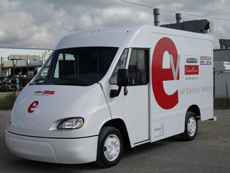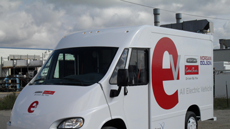Fleets: get an all-electric van for the cost of a diesel-powered commercial model

The Green for Free program aims to make all-electric vehicles more affordable to fleets. Gaffney, S.C.-based Freightliner Custom Chassis Corp. (FCCC) and Torrance, Calif.-based Enova Systems have launched the initiative, which allows fleet managers to purchase all-electric vehicles for the cost of diesel-powered units.
The savings that fleets see from the electric vehicles’ (EVs) reduced maintenance and fuel savings will be allocated over time to cover the incremental expense for the technology.
The program will use the FCCC All-Electric Walk-in Van (WIV) chassis powered by the Enova drive system. Fleets with set routes in pickup and delivery applications are suited for the Green for Free program because they have predictable drive routes and return each night to the government or commercial fleet depot. In addition, the project will focus on disciplined duty cycles within fleets. In those operations, about 80 percent of the battery power is expended daily, versus extended-range applications.
“The commercial vehicle market has relied on government funding for alternative-fuel vehicles with some success,” said a statement announcing the Green for Free program. “However,” the statement continued, “this is the first program that will eliminate the overall incremental costs associated with buying and operating an all-electric vehicle, making the program attractive to fleets that are both large and small.”
Through the program, FCCC and Enova plan to deploy a total of 3,000 alternative-fuel vehicles to fleets within a two-year time frame beginning the third quarter 2012.
“FCCC and Enova recognize that the Green For Free program is necessary in order to make all-electric vehicles more affordable, and therefore more accessible, to fleets,” said Bob Harbin, FCCC president. “We want to help those fleets interested in reducing their energy consumption and environmental impact by enabling them to purchase more alternative-fuel vehicles at one time because of the reduced upfront costs.”
Enova and FCCC have developed an integration method for both new and retrofit applications. FCCC’s all-electric chassis is built on the FCCC MT-45 chassis, which can accommodate heavy payloads. The chassis has a gross vehicle weight rating of 14,000 to 19,500 pounds.
“This business model has the potential to stimulate tremendous and rapid growth, helping achieve economies of scale through cost reduction, resulting in an excellent value proposition for the commercial fleet operator,” said Mike Staran, Enova president and CEO. “Enova has been delivering proven electric drive systems to a diverse set of domestic and international customers and has the distinction of seeing more of its green drive systems on the road than any of its competitors. The company continues to build on more than 20 years of innovation and traces its roots back to General Motors’ EV1 electric car.”
FCCC offers custom chassis for motorhomes, walk-in vans and school and commercial buses. According to a press release, FCCC’s established presence in the market will ensure that the venture has the needed volume that will lead to reduced prices for some of the venture’s high-cost components, such as batteries. The company says that it is a leader in market share in WIV chassis sales and production, and that it was the first chassis manufacturer to bring the hybrid-electric vehicle and all-electric vehicle to market.
Enova Systems is a developer of hybrid-electric and all-electric drive systems and drive system components for the green commercial vehicle market. The company supplies environmentally friendly digital power components and systems products. The company develops, designs and produces non-invasive drive systems and related components for electric, hybrid-electric, and fuel-cell-powered vehicles in both the new and retrofit vehicle sales market.





















If you’re considering buying
If you’re considering buying a new automobile, compare the pros and cons of diesel-powered vehicles. Consider these facts to help you decide between a diesel-powered engine and a gasoline-powered one like firstly pros Diesels get great mileage. They typically deliver 25 to 30 percent better fuel economy than similarly performing gasoline engines. Diesels also can deliver as much or more fuel economy than traditional gasoline-electric hybrids, depending on the models involved and whatever rapidly developing automotive technology achieves. When it comes to refueling a car, drivers of gas- and diesel-powered vehicles have it easy. Electric Vehicles offer substantially lower fuel cost and net emissions with lower
maintenance costs. Electric Vehicles are cheaper to operate with low maintenance and up to 70% lower fuel costs.
helpful blog with a good
helpful blog with a good message. Electric automobiles are really very helpful for both community as well as for environment. when a user wants to buy a new automobile he must go through the electric vehicle because electric vehicles has many more good features than fuel vehicles. Electric cars are purely environmental friendly and the maintenance cost is also low. So instead of the fuel cars a user must go for the electric cars.